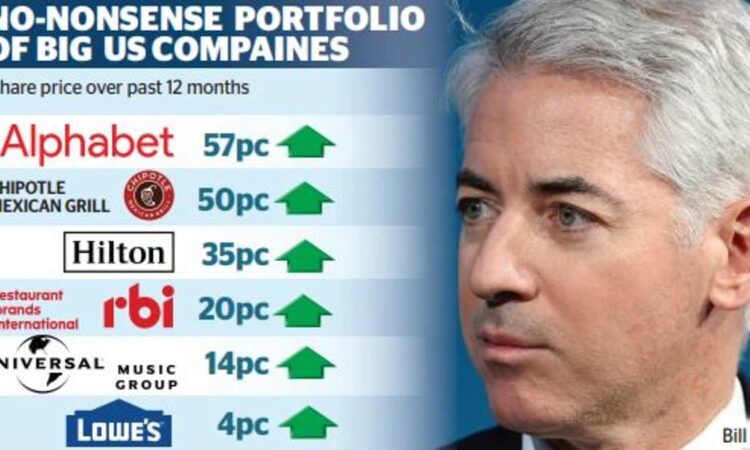
Until late last year, the billionaire US activist investor Bill Ackman was almost unknown outside Wall Street and the City, despite a series of corporate battles.
But his fame has now spread worldwide in the wake of his successful free-speech campaign to unseat the president of his alma mater Harvard. This has been a highly contentious fight, waged largely on X, formerly Twitter, where Ackman is the financier you cannot afford to ignore.
This intervention in the governance of academia is turning the spotlight on Ackman’s UK vehicle Pershing Square Holdings, a £6.5billion investment trust and a member of the FTSE 100.
Ackman has a persuasive way with words, as his 1.1million followers on X can attest. Should his stock-picking skills – which are also compelling – mean that you should be paying closer attention to Pershing Square?
Nick Wood, head of fund research at Quilter Cheviot, explains: ‘The trust’s portfolio is highly concentrated, made up of just 8-12 high quality stocks including Universal Music Group. In 2023, the strongest performers were the restaurant chain Chipotle Mexican Grill and the hotel group Hilton Worldwide. Alphabet, which owns Google, is a recent addition.’
This week the brokers Jefferies highlighted an Ackman post on X that seemed to hint at a possible US flotation of Universal Music Group – which could prove ‘a positive net asset value (NAV) catalyst for Pershing Square.’
Universal Music Group, which is listed on the Amsterdam exchange, boasts money-making artists such as Taylor Swift and the Weeknd. Its back catalogue includes a 1926 Tin Pan Alley hit ‘Put Your Arms Where They Belong’, written by Ackman’s grandfather.
Pershing Square declines to comment on this issue. But this is unlikely to stop the speculation – especially as it has also reignited talk that Ackman could switch the listing of Pershing Square to Wall Street. This would be closer to its roots: the trust is named after a square near New York’s Grand Central Station.
As a result of these rumours, Pershing Square is fast becoming an even more intriguing proposition than before, with growing focus on the disconnect between its results and its share price. Since the trust was founded in 2004 it has delivered a cumulative total net asset value (NAV) return of 1,762 per cent. This contrasts with 488 per cent for the S&P 500 index. Yet the shares stand at a 32 per cent discount to its NAV.
Ackman rose to prominence as a hedge fund manager, and Pershing Square’s portfolio bears witness to this expertise. Wood comments: ‘The hedging strategies aim to limit downside risk, or take advantage of compelling market opportunities.’
However, the hedges against ‘black swan and other global macro risks’, as Ackman describes them, are off-putting for some. It is possible to be impressed by Ackman’s opposition to Harvard’s DEI (diversity, equality and inclusion) ideology – which he regards as racist, rather than reformist – but still dubious about taking bets on interest rates.
Related Articles
HOW THIS IS MONEY CAN HELP
Yet Ackman’s stand appears to be increasing the interest around Pershing Square – which may have the side-effect of narrowing the discount. Doubt may have been cast on whether Ackman cares about this issue. But the trust’s spokespeople deny this charge – which is further undermined by the amount of personal ‘skin-in-the game’ investment that Ackman and his fellow managers have.
Ackman has said that ‘there is no short-term solution’ to the discount problem. But the trust is continuing its buyback programme, under which it purchases its own shares in the hope of boosting the price.
If you, like me, are fascinated by all this, you are not alone. Analysts too see the potential.
Winterflood Securities rates Pershing Square as a best buy. Emma Bird, Winterflood’s head of investment trust research, comments: ‘We see no good reason why this portfolio of very large and liquid US stocks should trade at a 32 per cent discount. Moreover, neither does the manager.’
James Carthew of QuotedData also argues that Ackman and his colleagues seem to be embarrassed by the discount. He comments: ‘It’s way too wide – given that this is a no-nonsense portfolio of big American companies.’
There ought to be more clarity about the outlook at the trust’s annual investor meeting in London next month. In the meantime, investors will be drawn to the enigma that is Pershing Square.
Wood comments: ‘The discount offers investors a good entry point, with the potential opportunity for further upside gains as the economic environment normalises.’
Pershing is set to play a bit-part role in my portfolio.
Why not take a gamble on a situation that could offer long-term gains, but should also provide entertainment value?
Some links in this article may be affiliate links. If you click on them we may earn a small commission. That helps us fund This Is Money, and keep it free to use. We do not write articles to promote products. We do not allow any commercial relationship to affect our editorial independence.






